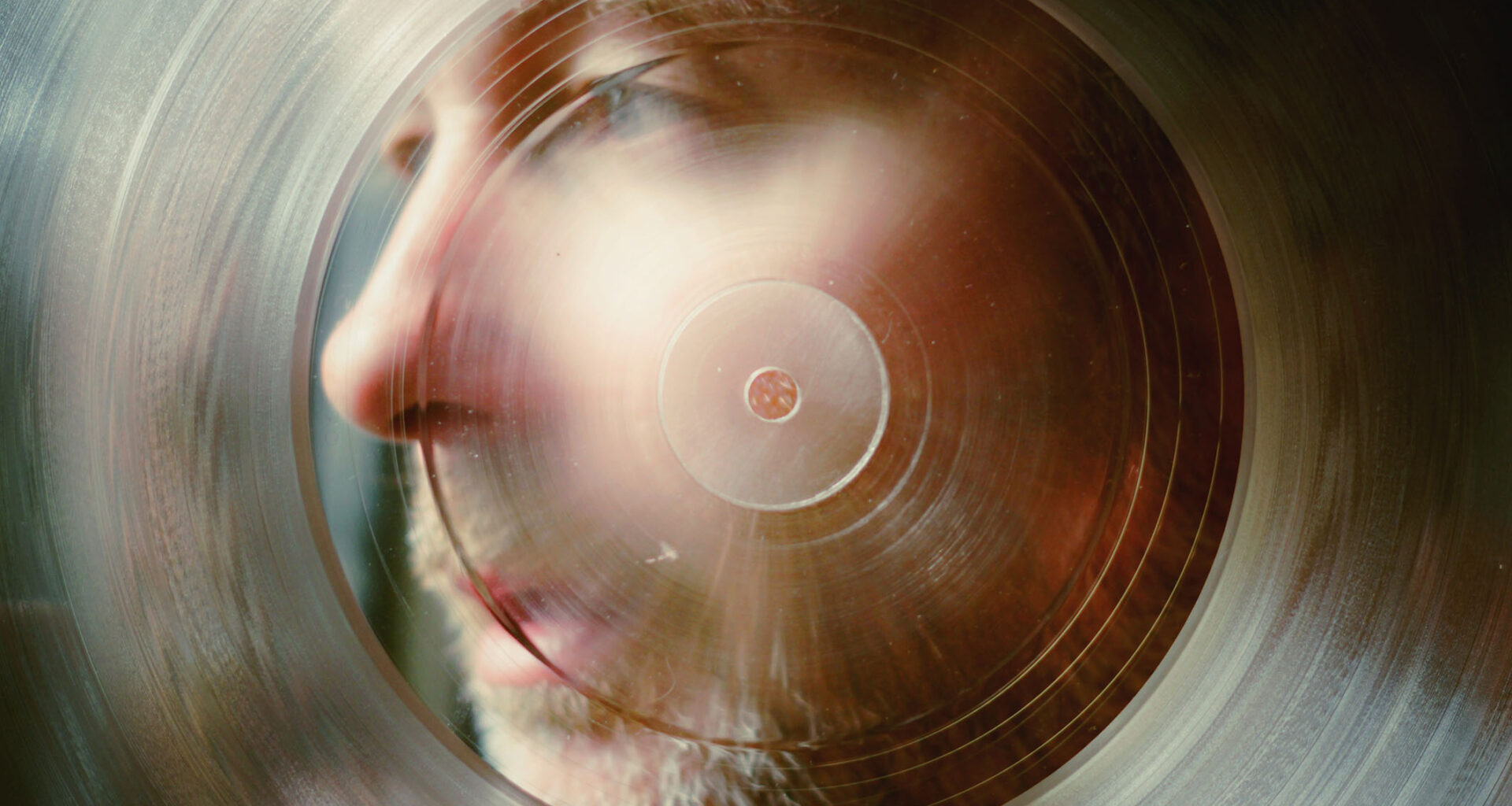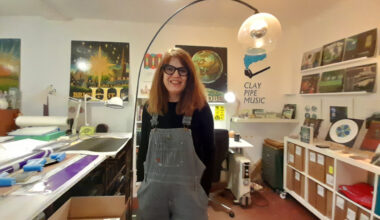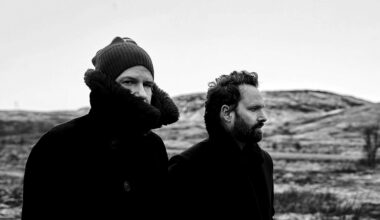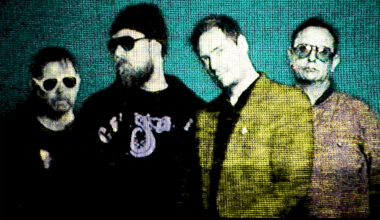Stereolab man Tim Gane has spent the last few months trawling through the archives of Sky Records, the quintessential late-phase krautrock label. The result is ‘Kollection 01’, the first in an exciting new series of German music compilation albums
Tim Gane has lived in Berlin for the best part of a decade. He first visited the city in 1985, when he was a member of McCarthy, one of the stars of the NME’s famous ‘C86’ cassette. He says he fell in love with the place right from the off and he regularly returned to the cosmopolitan, easy-going German capital in the years thereafter, generally when on tour with Stereolab, the group he formed with Laetitia Sadier in 1990.
Berlin’s well-documented musical history has always been one of the big draws of the city for Tim. His fondness for German experimental electronic music – krautrock and kosmische, as well as the later Neue Deutsche Welle (New German Wave) – is no secret. His admiration for the way that krautrock rhythmically anchored its innovative nature with steady, sometimes hypnotically repetitive percussion helped to frame the Stereolab credo from the beginning. So while the Stereolab sound transmutes so much more besides – bubblegum pop, jazz, electro, yé-yé, tropicália and a whole lot more – the group’s krautrock influences must surely have marked Tim Gane out as an obvious candidate to curate ‘Kollektion 01’, the first in a series of compilations of 1970s and 80s German music for Bureau B Records.
Tim’s krautrock epiphany came in 1980, when he read a review of a reissue of the first Faust album in Sounds, the long-gone UK weekly music paper.
“I was a big fan of bands like Cabaret Voltaire, so I’d had my ears opened to bolder, more experimental electronic music,” he notes. “The review talked about it sounding like a lot of the contemporary music I was into, but said the album had actually been recorded in 1971, which seemed incredible to me. I went straight out and bought it… and it knocked me out.”
Not long after, he bought Faust’s follow-up release, ‘Faust So Far’, rapidly followed by the first Neu! album.
“I was struck by how different these records sounded to the relentlessness of some of the industrial-type music that was about at the time,” says Tim. “With their strange sounds coupled with those superb rhythms, they informed my musical development from there. I can’t think of a single German band who deviated from that willingness to explore the further reaches of experimentation with heavy and industrial sounding compositions, along with some often extremely melodic tracks, and all of it generally on the same record. Faust typified that to me – very heavy, but with the light and the shade.
“Krautrock has always been a bit of a niche genre, which I think is because the dominant mindset is that the best rock music was only ever made in the America or Britain. But some music is made to just be discovered and you have to find it out for yourself. I suppose part of the problem with krautrock has been that it’s so difficult for people to categorise. In many ways, it’s a music that falls in between genres, but it’s also true that it has grown in currency over time, as opposed to, say, blues rock, the currency of which has fallen pretty dramatically.”
‘Kollektion 01’ features material originally released on Sky Records, a Hamburg label founded by Günter Körber in 1975. Körber had spent the previous four years working with Bruno Wendel at the helm of the legendary brain imprint, developing an incredible roster of talent that included Neu!, Tangerine Dream, Amon Düül, Cluster and Harmonia. Sky went out of business in the late 1990s and Günter Körber sadly died at the end of 2013, but Bureau B have released several classic Sky albums during the last year or two.
The tracks on ‘Kollektion 01: Sky Records’ span the period from 1975 through until 1984. So what was the appeal of Sky Records for Tim Gane?
“Much of its output represents the later period of krautrock, when a lot of the artists were more inventive and playful but also focusing on the more experimental side of things,” says Tim. “By the second half of the 1970s, the rock elements had pretty much gone and an enormous amount of captivating music was being produced.”
Tim says he already owned around 25 Sky albums when he was initially approached to oversee the project. Once Bureau B had added several more to his stack and his friends had chipped in with other recommendations, he found himself with some 45 albums worth of tracks to start culling from. At which point, he had to discover the ruthless editor within in order to arrive at a manageable amount of music. An early decision to include a large proportion of the more accessible material and not get too distracted by many sideways journeys into the nether reaches of sound manipulation helped with the filtering.
Amassing and assessing the raw materials, whittling down the pages and pages of lists, and then putting together the final product still took Tim a long time, though. Was it hard work?
“Not at all,” he laughs. “It was so nice to make a record and not be musically involved! You will understand a lot about me from listening to this collection.”
The easiest part of the curatorial process for Tim was deciding where to begin.
“As soon as I was asked to do this, I knew it had to start with Asmus Tietchens. I’d been mulling on some tracks for a mix for Mouse On Mars and had a few Tietchens pieces in mind for that, so I quickly realised that ‘Wein Aus Wien’ would be the opener. It’s from one of his earlier albums [1982’s ‘Spät-Europa’] and was a revelation to me when I heard it. His work became more abstract as his career progressed, but this is more immediate and sets the scene nicely.”
The tracks that follow aim to broaden even the most active krautrock listener’s appreciation of the late 70s and early 80s scene, a period that’s so far been largely left alone in terms of UK compilations. Some of it, such as the second Asmus Tietchens piece, ‘Trümmerköpfe’ (“I love its child-like bounciness and its goofy melodies, but then it fragments and dissipates – wonderful stuff!” says Tim), might even shock the hardcore motorik buffs. Elsewhere, the likes of Günter Schickert and Wolfgang Riechmann sit perfectly alongside work from more familiar names such as Cluster, Conny Plank, Neu! man Michael Rother and honorary German Brian Eno.
Having spent so many long days weighing up the tracks, does Tim have a particular favourite?
“There are so many highlights, it’s difficult for me to single even a selection out,” he says. “It’s just not possible.”
“Proto” is an oft-used prefix when music critics talk about krautrock – and again it’s hard to escape here. The pulsating proto-electro bassline that kicks off Moebius & Beerbohm’s epic ‘Doppelschnitt’ is a prime example.
“It reminded me of the early New York underground dance records that might have been played in clubs like Paradise Garage,” says Tim. “It’s so exciting – musically complex yet somehow technologically crude.”
It’s not until the fourth track of the compilation that we get to hear the classic motorik percussion, though. But it should come as no surprise that it’s on a Michael Rother cut, ‘Feuerland’, which is taken from his first solo album, ‘Flammende Herzen’.
“Rother had well and truly parted ways with [Neu! drummer] Klaus Dinger by the time ‘Feuerland’ was recorded in 1977,” notes Tim. “So it’s actually Jaki Leibezeit from Can that you can hear playing on this one. It’s got such depth to it. I think it’s equal to anything Neu! did.”
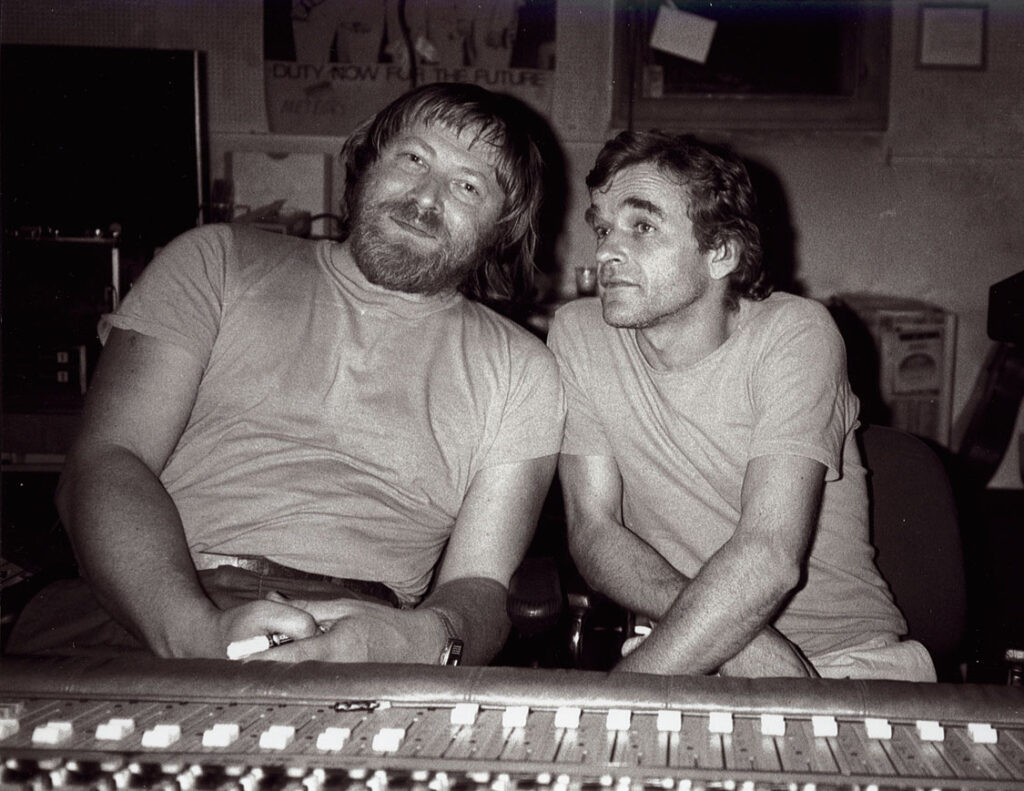
Conny Plank, the legendary Neu! and Kraftwerk producer, is another of the star attractions. He contributes a Duane Eddy-esque guitar to ‘Conditionierer’, a 1981 track from ‘Material’, one of the five albums he recorded with Dieter Moebius, and he also pops up as the producer of ‘The Belldog’ from the classic 1978 Eno Moebius Roedelius album ‘After The Heat’.
“With the Moebius & Plank track, you can hear that Plank was obviously a bit of a rocker,” says Tim. “He brings a fun, rockabilly edge to it and it’s as close to party time as you get on this album. But I also love the way Moebius disrupts that aspect and takes the track in a completely different direction. The interplay between them both is amazing.
“The Eno Moebius Roedelius track is pretty special. I chose it for its uptempo groove and also because it really reminds me of Eno’s ‘Before And After Science’ period. For me, ‘The Belldog’ represents the beginning of a very significant time for Eno and puts me in mind of the work he did with David Byrne. It’s harmonious and accessible and very contemporary.”
‘The Belldog’ is indeed something else. Eno’s palpably English vocals are a real jolt, somehow relocating the track and indeed the krautrock genre itself. In a way, the fact that Eno is involved in only one track here makes it stand out that bit more. Other one-off contributions come from Günter Schickert, with whom Tim Gane has himself collaborated, and the little-known Wolfgang Riechmann, whose life was tragically ended by a knife-wielding thug outside a Dusseldorf pub in 1978. This was the same year that his featured track, the soaring, glacial ‘Himmelbau’, was recorded.
“I bought the one and only Riechmann album [‘Wunderbar’] years ago in a flea market and then kind of forgot about it. But I revisited it for this project and ‘Himmelbau’ really stood out for its simple layering. It’s emotional and has an air of focus but also relaxation.
“The Schickert track, ‘In Der Zeit’, is not especially typical of much of his stuff, which often features layered guitars, but I love the vocals on this one and I like the way the melody conveys a kind of sour, ambiguous aspect. I regretted not being able to include another of his tracks, ‘Pulse’, because it was just too long, but I really do recommend that people check him out.”
‘In Der Zeit’ certainly is a delight, cleverly juxtaposing emotionally nuanced female vocals with field recordings of chirping churchyard sparrows, overlaid against incongruously inundating ocean waves. It’s a real highlight of the compilation.
If there’s one artist whose music stands paramount on ‘Kollektion 01: Sky Records’, it’s the beguiling and delicate experimental work of Hans-Joachim Roedelius. He contributes five tracks in addition to the Eno Moebius Roedelius piece, each one showcasing a subtly different aspect of his compositional style.
Roedelius, who recently celebrated his 80th birthday, founded Berlin’s Zodiac Free Arts Lab with Conrad Schnitzler in 1968. He and Schnitzler met Dieter Moebius at Zodiac and two years later the trio formed Kluster (later anglicised to Cluster, for reasons best known to themselves). He also played alongside Michael Rother and Moebius in Harmonia before embarking on a solo career at the end of the 1970s.
By this point, Roedelius was installed at an isolated rural retreat in Forst, Lower Saxony. He’d initially escaped there with Moebius a few years earlier in order to be able to work more freely and now he embarked on his sonic adventures in earnest. Of his solo tracks included here, ‘Glaubersalz’ is the most immediately captivating, not least because it showcases his trademark light-touch keyboards that have an almost baroque, harpsichord-like quality.
“Roedelius is very much at the heart of this compilation,” acknowledges Tim Gane. “I love all his stuff and I admire his incredible creativity. What gets me about ‘Glaubersalz’ is the small vignettes of mood and the combination of minor, melancholic chords with those gentler, otherworldly sounds. Of the other Roedelius contributions, ‘Regenwurm’ sums up the period when he was in the country and I think it symbolises something very significant, and ‘Geradewohl’ has great power but is understated in a way that’s not at all self-conscious. It’s calm and pastoral, but also insistent and purposeful.”
The Sky Records ‘Kollection’ ends with another Roedelius piece, the celebratory ‘Auf Der Höhe’ from 1982’s ‘Offene Türen’, one of the keyboardist’s more avant-garde albums.
“When I heard it, I knew this had to be the last track here,” says Tim, evidently reminded of its episodic aptness. “It strikes me that it was an arranged piece in the way that a classic early pop record might have been back when there wasn’t the advanced studio technology, so everything had to be carefully planned and thought-out. At the same time, it also manages to sound quite informal, which is something else I really like about it.”
Tim Gane should certainly be commended for his meticulous work in putting together the Sky Records compilation. It’s a terrific snapshot of the label’s extraordinary output, something that should please the aficionados while at the same time being accessible and, in many places, great fun. Tim’s enthusiasm for the project is clear from the time and energy he’s devoted to it over the past few months, as well as the time and energy he’s spending talking about it now. In this instance, it’s been a full 90 minutes.
Tim says he’s off to the studio when this interview is over. He’s currently working on new material with Cavern Of Anti-Matter, a project he formed with one-time Stereolab drummer and fellow Berlin resident Joe Dilworth a couple of years ago. The group released an album called ‘Blood-Drums’ on Grautag Records last year. But before Tim goes, he’s happy to offer up a few words about Stereolab, who have been on an indefinite hiatus since 2009.
“We all needed a break, some time away to do other things,” he says. “I’ve just done another film soundtrack and we’ve recorded 60 to 70 per cent of another Cavern Of Anti-Matter record, so it’s been good to get involved with new stuff like that. Nothing specific happened to make Stereolab stop, we just decided we didn’t want to do anything more until something radically interesting occurred – whatever that might be! We’re doing a whole series of reissues next year and we’re remastering tapes as well, and there’ll be some unreleased tracks in there, so who knows what might happen once we’re into that…”
Remember where you read it first.
‘Kollection 01: Sky Records’ is released on Bureau B
